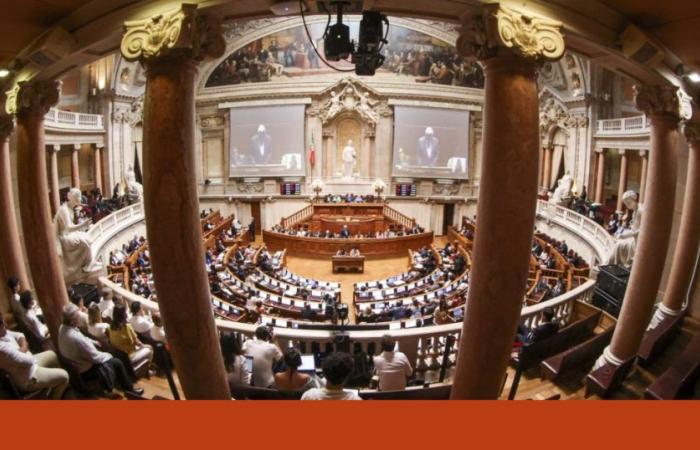We have never known democracy in any other way: representative, supported by political parties and elected deputies sitting in a semicircle in the Assembly of the Republic. Fifty years after the 25th of April, more than half of Portuguese people (70%) want ordinary citizens, through referendums, to make the most important decisions for the country. The overwhelming majority are also “very critical” of politicians: more than 80% consider that “elites only defend their privileges and perks”, “they are often dishonest and corrupt” and “they talk a lot but do little”.
Despite continuing to choose democracy over any other form of government, without much doubt and despite the defects that they also point out, the Portuguese “are unhappy with their performance”, explains Manuel Meirinho Martins, one of the coordinators of the research project 50 years of Democracy in Portugal: Democratic Aspirations and Practices – Continuities of Generational Change (ISCSP/CAPP).
The third part of the survey carried out by the Instituto Superior de Ciências Sociais e Políticas of the University of Lisbon, of which PÚBLICO is a partner, measures adherence to different populist attitudes among voters, from anti-system (very popular) to anti- immigration (residual).
The concept of populism is not consensual, there are almost as many definitions as there are academics who have studied the doctrine. The approach that researchers adopted defines it as an ideology that divides society into two poles — the “pure people” and the “corrupt elite” — and argues that it must be the general will of the people that dictates policy. The Portuguese, in general, align themselves with this idea — and radical right parties exploit it.
Manuel Meirinho Martins remembers that the profound “discontent and dissatisfaction with the political class is not new”, it is in fact “a structuring phenomenon of Portuguese democracy”. The vast majority of respondents (86.7%) believe that parties and politicians defend their own privileges and 82.1% think that the political class is “often dishonest and corrupt, harming the collective interest for their own benefit.” The researcher and former PSD deputy explains that this is also why several populist parties speak of a “purification of political actors”, presenting themselves as the only hypothesis, “redemptive of a collapsing political system”.
Although the legislative elections on March 10 were the most attended since 1995, the majority of Portuguese people do not believe in the representative democratic process as they know it: 70% are in favor of the idea of giving “the people” the power to “make decisions most important for the country, through referendums”. Having the “people” as a “morally superior entity” is one of the common features of populism, according to the definition used in the study, and works as a reaffirmation of the “struggle” between ordinary people and political elites.
Anti-elitist, pro-immigration
The distribution of anti-system and anti-elitist attitudes across the political spectrum is proof of their spread: it is so high that membership in the central bloc represents 76%, followed by the extreme right with 17%. It is because it is so consensual that “the electoral results in the spectrum that most prevails in populism – Chega – reach this level [de percentagem de votos nas eleições legislativas]”, concludes Manuel Meirinho Martins.
Anti-immigration rhetoric, which is part of all the speeches of radical right-wing populist parties in Europe, continues to be “quite a minority and residual”, says the study coordinator: 17% of Portuguese people believe that the presence of immigrants and Refugees are a disadvantage in economic, social and cultural terms for the country’s progress.
In November 2023, a study concluded that anti-immigration movements in Portugal are “increasingly organized”. At the beginning of 2024, a neo-Nazi group called for a demonstration “against the Islamization of Europe”, in Martim Moniz, in Lisbon — it ended up happening but between Largo Camões and Praça do Município. In April, in Porto, an anti-immigration demonstration, called by Grupo 1143, led by the well-known far-right activist Mário Machado, collided with an anti-fascism demonstration.
Portugal is “a democracy in consolidation”, there is no alignment with anti-pluralist views, says Manuel Meirinho Martins. The Portuguese are not against the political system itself and believe in the plurality of opinions: only 3.7% consider that “it is not important to make compromises between different opinions and points of view”.
Regarding the inclusion of minorities in the country’s political life – highly contested by the extreme right, which sees them as “strange elements that challenge identity and traditional values” –, only 3% admit the idea that “it is not important to listen to groups minorities”.
The Portuguese who most adhere to populist attitudes are adults with a low level of education, are between 35 and 64 years old, live in large towns or cities, are unemployed and deal with weak economic conditions. They believe more than any other segment of the population that politicians are corrupt, that they only defend their privileges and that “they talk a lot, but do little”. Although the anti-immigration dimension is “minority” across the population, it is within the same group of people that it is most popular.
Those who agree with these attitudes tend to see politicians as not only distant from ordinary citizens, but also disconnected from the concerns and interests of those who elected them. When analyzing the political system, they do not believe in the institutions that build it, they are dissatisfied with the functioning of democracy and the country’s economic situation. More than 70% reveal exposure to political information, both in traditional media and through social networks. The study coordinator states that the accumulation of “cases and cases” generates greater distrust among the electorate.
Young people trust politicians less and are less anti-immigration
Young people have a reputation for protesting, but here the conclusions are different. They align themselves with the anti-system and anti-elitism vision and trust politicians even less: 85% believe that “politicians should always follow the will of the people” and 72% think that the most important decisions for the country should pass directly into their hands of citizens. These data show what had already been confirmed in the general population: this populist rhetoric “it is strongly rooted”, reiterates Manuel Meirinho Martins.
It is in immigration that young people between the ages of 16 and 34 differ most from the rest of the population, albeit only by four percentage points. Only 12.9% consider that immigrants and refugees are a disadvantage for the country, compared to 17% in the general count.
Note: PÚBLICO is a partner of ISCSP-ULisboa in the project “50 Years of Democracy in Portugal: Aspirations and Democratic Practices – Continuities of Generational Changes (ISCSP/CAPP, coordinated by Manuel Meirinho, Conceição Pequito and Pedro Fonseca)” and will publish throughout 2024 several articles on the results of the national survey carried out within the scope of the project.
Tags: Portuguese important decisions referendum years April #25th
--





